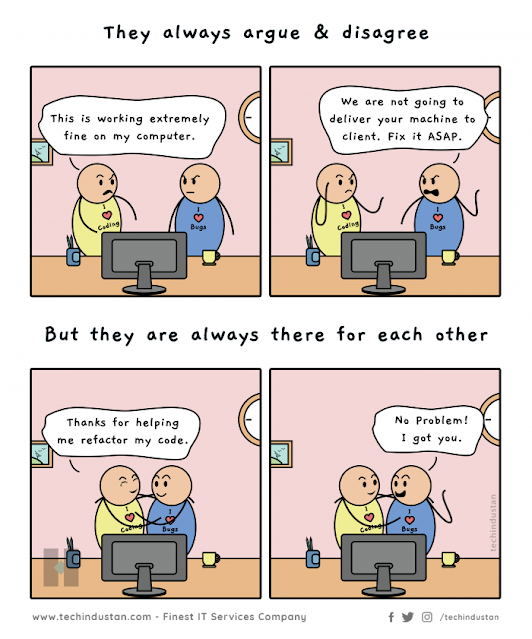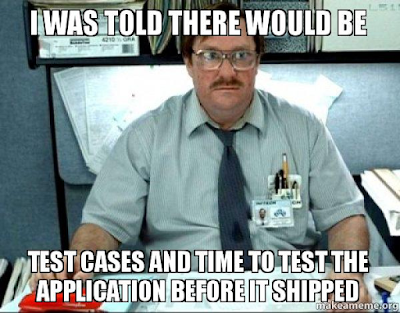Why I Almost Gave up on Software Testing as a Career
We often hear that everything is a matter of perspective and in light of that notion I have to admit that there was a time in my career when I wanted to give up on testing. Due to having seen testing in a wrong (and rather shallow) light, I pondered hard about leaving it for good for a career in web development. So, let us get into the meat of things.
Now, when I talk to people I offer hear them describing me as someone who enjoys testing and is genuinely passionate about software quality. So how was it that I found myself in a situation where I wanted to quit being a tester if I love it so much? It was many years ago, and while I can't disclose exact details, I can talk about it in general terms. This blog post is in part inspired by my personal experience and also by observations I made while talking to lot of testers trough the time - and most of them relatively similar experiences to share, from some point at their career. It is my hope that by discussing things such as this one might help clear up some misconceptions people may have about testing in general.
One of the main reasons why you might have a wrong idea about testing is being in a work environment where testing is not being taken seriously and where the Software Testing Life Cycle process is poorly defined, non-existent or it is not fit for the needs of the company. This can give people the impression that testing is an unimportant activity, since if it was important it would be better structured, right? Usually there is not just a single person to blame for this, the upper management (the big-wigs calling the shots) might not know enough about testing and software delivery in general to realize that testing is done the wrong way. Another point of blame could be the testers themselves, ignorant and incompetent testers will push back against establishing a rigorous testing process, as that will make their lives harder - they will be forced to learn and do actual work - just imagine the horror...
In practice, this can imply improper use of tools, or the use of wrong tools. For instance, instead using some sort of tried and true test management tool (X-ray, Zephyr, Testrail, to name a few.) there are places where they write test plans in plain old word documents and store test cases in excel sheets! Companies where testing is done in a flawed way usually do everything else in sloppy manner. Just imagine working in a place where no software development methodology is applied, be it some flavour of Agile or even Waterfall. Places like that will lack skilled project management staff and development will usually being done in a chaotic and inefficient manner.
Apart from bad management, another cause of major issues can be low code quality, which is usually caused when a company tries to save money by hiring cheap and lousy developers - ironically making them lose a lot more money in the long run, as they will have a bunch of bugs present in production, a lot of them really embarrassing, which could have been prevented by proper testing. Also, these kind of companies will be forced to hire large teams of customer support techs to deal with a significant number of frustrated customers. Bad coders are usually pretty arrogant (clueless and insecure people generally are the most arrogant ones) and difficult to work with. I have witnessed first hand what this is like, they will even lie about fixing staff and have you waste time by testing it only to find out that the issue is still not fixed - commonly known as bug ping-pong. But the most hilarious things I have witness is a guy actually saying the words: "It's a feature, not a bug" - the dude was dead serious and it was one of the most obvious bugs I have seen. Another gem the same dude said was that he doesn't care if it is not working in test environment as it "works on my machine" so it's not his fault, but must be something wrong with the environment, as his code was flawless - turns out the code he had deployed to test had a typo and the local version was fixed in the meantime...
So what is a tester to do? Well, in my case I thought that by changing my carer path I wouldn't have to be a "lame tester" anymore. I invested a lot of time into studying web development, completed a bunch of courses, took several freelance gigs (I was top-rated on Upwork at one time) and I also applied to over a 100 web developer job openings and internships. And as fate would have it, the next job I got I didn't even apply to, it was via a recommendation from a former co-worker who left the company, about a year before me, and he was aware that I'm looking to grow professionally, so he vouched for me. The new company needed a tester, I passed the technical interview with ease and accepted the offer. Boy, was I in for a surprise! They not only had a clearly defined and well structured testing process in place, but, there were also a lot of highly experienced testers on the project to learn from - this was the most important project for the company at the time. All of this ended my prejudices I previously had about testing - I realized that testing can be a serious activity, that testers can be highly knowledgeable and technical. I didn't even have to stop coding - I discovered more about this wonderous little thing called test automation! Besides, the knowledge I gained while learning to become a web developer helped me a lot in being a better tester! Apart from that, another huge plus was the fact that I started working with top-notch developers who cared about delivering high-quality software to the end-users and there was literally no place for hostility between QA and the Dev. Nobody hated me for reporting bugs, after all, we were all working towards a common goal.
If you get in a similar position, the best thing to do is to start asking a lot of questions and to try look at thins from a different angle. If you reach the conclusion that the you're not the root of the problem, and you can't change the situation for better after trying, it might be a sign that you should move on. Luckily there are plenty of jobs in IT today, so don't despair fellow tester, there' plenty of choice!









This post is so usefull and informative.keep updating with more information...
ReplyDeleteBest Software Testing Institute In Mumbai
Software Testing Courses In Ahmedabad
Software Testing Training In Kochi
Software Testing Courses In Trivandrum
Software Testing Training In Kolkata
Hey,
ReplyDeleteThanks for sharing this great blog. It contains a lot of information. It is easy to locate a Web Application Development in India. But hard to choose the best Web Design services like this. All your services look very professional. Keep posting.
This is very helpful content, AlphaBOLD’s Automation Testing Services enable constant delivery & deployment of business applications with high-quality Software Quality Assurance Testing tools.
ReplyDeletevery useful and knowledgeable. Really it's a Great Article. Keep it up. RobotFlux is one of the top acceptance testing software . If you are looking for the best testing software service online, visit RobotFlux official website.
ReplyDeleteReally thanks for sharing this great knowledge. We RobotFlux also offer the best test case management tool . To know more about our services, visit our website!
ReplyDeleteYou have written an excellent blog. I learned something new from your Blog. Keep sharing valuable information. WDP Technologies
ReplyDeleteGreat post. keep sharing such a worthy information.
ReplyDeleteUsually I do not read post on blogs, but I would like to say that this write-up very forced me to try and do it! Your writing style has been surprised me.
Training Institute in Electronic City Bangalore
Software Training Institute in Electronic City Bangalore
Devops Training in Electronic City Bangalore
Python Training in Electronic City Bangalore
Python Course in Electronic City Bangalore
The journey towards a successful career doesn't end with completing the course. The Software Testing Training Course in Noida goes the extra mile by offering placement assistance and career support to all graduates. With a vast network of partner organizations and connections in the industry, students are well-equipped to secure lucrative job opportunities and launch their careers with confidence. Recognizing the diverse needs of learners, the course offers flexibility in learning options. Students can choose from weekday or weekend batches, and even opt for online learning if they prefer a remote approach. This adaptability ensures that aspiring testers can pursue their passion for software testing without compromising on their existing commitments.
ReplyDelete
ReplyDelete"Wow, huge thanks for the software testing course blog! It was incredibly helpful and truly motivated me. I gained so much valuable knowledge from it, and it really improved my understanding. Please keep creating fantastic content like this – you're truly making a positive impact!"
Regards, Software Testing Course
Join the ranks of successful software testing professionals with APTRON Solutions' Software Testing Course in Noida. Whether you're starting your career or seeking to enhance your skills, our comprehensive program equips you with the knowledge, practical experience, and industry certifications needed to thrive in the competitive IT landscape. Enroll now and take the first step towards a rewarding career in quality assurance.
ReplyDeleteJoin the ranks of successful software testing professionals with APTRON Solutions' Software Testing Course in Noida. Whether you're starting your career or seeking to enhance your skills, our comprehensive program equips you with the knowledge, practical experience, and industry certifications needed to thrive in the competitive IT landscape. Enroll now and take the first step towards a rewarding career in quality assurance.
ReplyDeleteJoin the ranks of successful software testing professionals with APTRON Solutions' Software Testing Course in Noida. Whether you're starting your career or seeking to enhance your skills, our comprehensive program equips you with the knowledge, practical experience, and industry certifications needed to thrive in the competitive IT landscape. Enroll now and take the first step towards a rewarding career in quality assurance.
ReplyDeleteJoin the ranks of successful software testing professionals with APTRON Solutions' Software Testing Course in Noida. Whether you're starting your career or seeking to enhance your skills, our comprehensive program equips you with the knowledge, practical experience, and industry certifications needed to thrive in the competitive IT landscape. Enroll now and take the first step towards a rewarding career in quality assurance.
ReplyDeleteNice and informative blog! This type of information excels in ensuring seamless functionality and unmatched reliability.
ReplyDeleteIf you want to know about Software testing company in US then you can click here.
Thanks for sharing.
Hi nice blog thanks for posting. Master software testing with our specialized Selenium Training in Bangalore
ReplyDeleteOur Software Testing Institute in Noida offers a range of courses covering both manual and automated testing. From understanding the fundamentals of testing methodologies to mastering tools like Selenium, QTP, and LoadRunner, our courses are designed to provide a thorough understanding of the software testing lifecycle.
ReplyDeleteOur Software Testing Institute in Noida offers a range of courses covering both manual and automated testing. From understanding the fundamentals of testing methodologies to mastering tools like Selenium, QTP, and LoadRunner, our courses are designed to provide a thorough understanding of the software testing lifecycle.
ReplyDeleteVery good content thanks for posting. Upskill in software testing with our specialized Software Testing Training in Bengaluru
ReplyDeleteReally insightful! Thanks for breaking this down.
ReplyDeleteAdobe Photoshop Download
SuperAntiSpyWare Pro
PC Helpsoft Driver"
very interesting article ! more informative thanks for sharing..
ReplyDeleteSoftware Training Institute in Chennai
Best AEM Training Institute In Chennai
IOT Online Course in Chennai
React Native Training Classes in Chennai
Internet of things Academy in Chennai
IOS Course in Chennai
Php Coaching Centre in Chennai
Android Training Course in Chennai
Best UI/UX Design Training in Chennai
Software Testing Classes in Chennai
Digital Marketing Training Institute in Chennai
AEM Online Training Course
CQ5 Development Course in Chennai
Laravel Online Course In Chennai
Laravel Php Framework Training Course In Chennai
Android online Training in Chennai
IOS Online Training in Chennai
Best IOS Training Institutes in Chennai
React Native Online Training in Chennai
Best React Native Training Institutes in Chennai
Web Designing Course in Chennai
Best UI/UX Web Development Courses in chennai
Manual Testing Training in Chennai
React Native Online Training in Chennai
Software Testing Courses in Chennai
Digital Marketing Course in Chennai
very interesting article ! more informative thanks for sharing..
ReplyDeleteSoftware Training Institute in Chennai
Best AEM Training Institute In Chennai
IOT Online Course in Chennai
React Native Training Classes in Chennai
Internet of things Academy in Chennai
IOS Course in Chennai
Php Coaching Centre in Chennai
Android Training Course in Chennai
Best UI/UX Design Training in Chennai
Software Testing Classes in Chennai
Digital Marketing Training Institute in Chennai
AEM Online Training Course
CQ5 Development Course in Chennai
Laravel Online Course In Chennai
Laravel Php Framework Training Course In Chennai
Android online Training in Chennai
IOS Online Training in Chennai
Best IOS Training Institutes in Chennai
React Native Online Training in Chennai
Best React Native Training Institutes in Chennai
Web Designing Course in Chennai
Best UI/UX Web Development Courses in chennai
Manual Testing Training in Chennai
React Native Online Training in Chennai
Software Testing Courses in Chennai
Digital Marketing Course in Chennai
Insightful read! At Hitek Computer School, we understand that the journey into software testing can be challenging, especially when faced with environments lacking structured processes. Our curriculum emphasizes the importance of a well-defined Software Testing Life Cycle and the use of industry-standard tools to ensure quality and efficiency. We believe that with the right guidance and resources, aspiring testers can overcome these challenges and thrive in their careers. It's crucial to seek opportunities that value testing as a vital component of the development process. For those feeling disheartened, remember that persistence and continuous learning are key to success in the ever-evolving field of software testing.
ReplyDeleteFor more, visit https://hitekschool.com/